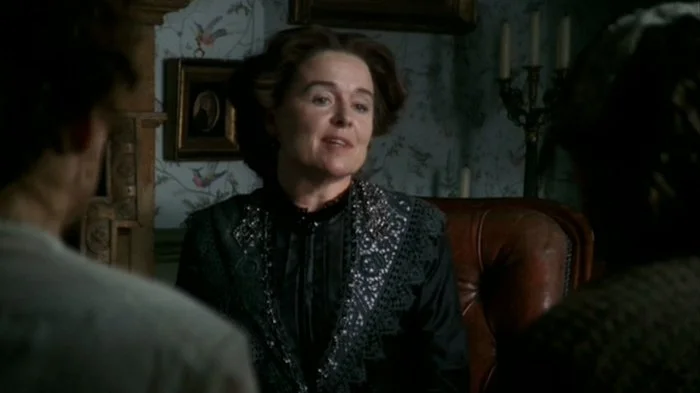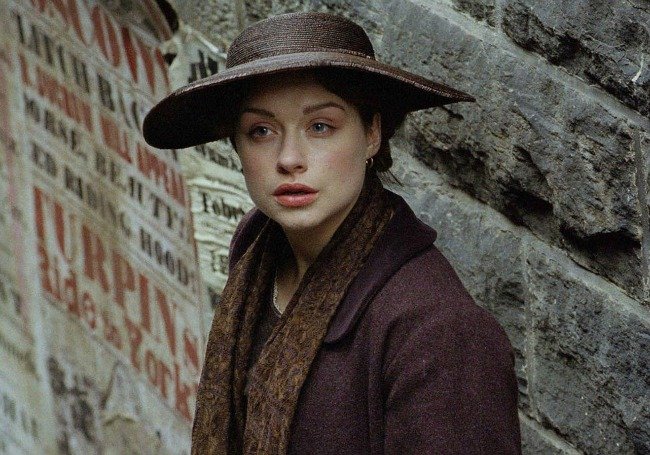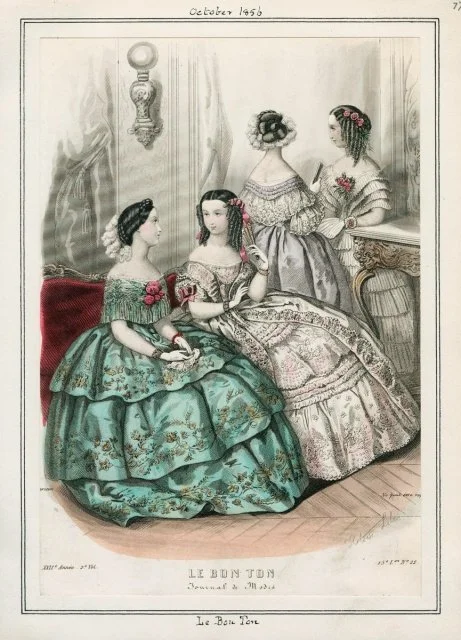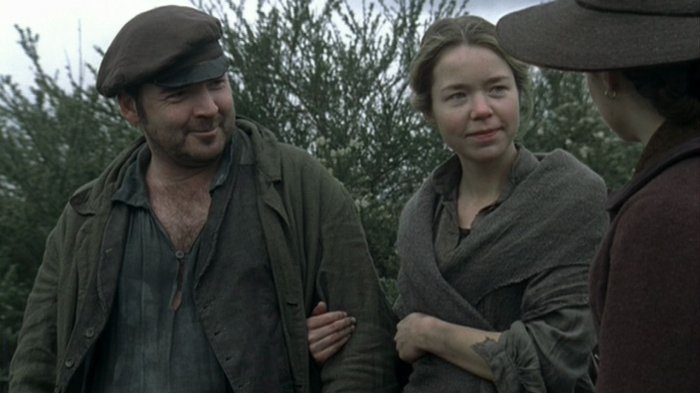When did John Thornton begin to think of marrying Margaret Hale? The short answer is … we’ll never know. I doubt if even Thornton could pin a moment to the nascent thought.
But — and this is the fascinating part — we do know that the idea of marrying her was kicking around in his mind for quite a while before he blurted out his love for her in that ill-fated attempt to claim her as his own the morning after the riot.
And how do we know this? Because there are clues throughout the book which I’ll share with you.
But first, let’s recognize that courtship and proposing marriage were an entirely different ball game in the Victorian Era. It was entirely feasible that you could marry someone you’d only socialized with a handful of times. Courtship had one ultimate purpose: marriage. A man’s interest in courting a woman would indicate an interest in marrying her.
Now, we know from Gaskell’s story that Thornton is gobsmacked by Margaret at their very first meeting. He is instantly attracted to her. At the very least, he’s very intrigued by this woman. He has an interest in her. And he has never been interested in any woman before. Something about Margaret makes all his bells and whistles go off!
This first meeting with Margaret takes place in November, and Margaret and Thornton don’t interact with each other again until “early spring” when he comes to take tea with the Hales.
It’s his mother that openly hints at the idea of marriage between Margaret and Thornton.
“Take care you don’t get caught by a penniless girl, John.”
“I am not easily caught, mother, as I think you know. But I must not have Miss Hale spoken of in that way, which, you know, is offensive to me. I never was aware of any young lady trying to catch me yet, nor do I believe that any one has ever given themselves that useless trouble.”
Mrs. Thornton re-asserts a warning that southern girls may be looking for a rich husband, and he basically confesses that his only interaction with Margaret gave him the impression she would not be interested in him as a husband.
“Mother” (with a short scornful laugh), “you will make me confess. The only time I saw Miss Hale, she treated me with a haughty civility which had a strong flavor of contempt. She held herself aloof from me as if she had been a queen, and I her humble, unwashed vassal…”
Thornton is a man of reason and logic. He perceives that Margaret wouldn’t be interested in him as a husband, so it would be illogical of him to consider the possibility. Right? But since when do the longings of the heart obey the rules of logic?
Before he steps into the Hales’ house for tea we have to wonder: has he been thinking about her at all during those winter months?
I believe he has, for he’s scarcely stepped into the Hales’ drawing-room before he’s attributing the comfortable beauty of the room with Margaret’s nature! He’s only known her for half an hour and he believes he knows how a home with Margaret in it would look and feel.
Mr. Thornton likes what he sees. (all images are from the BBC’s North and South.)
And then comes the famous tea-cup scene where Thornton is fascinated with watching Margaret pouring tea. There is definitely a sexual attraction to her. Right about now he’s probably thinking he wouldn’t mind being “caught” by this southern girl!
With his mother’s warning about marriage echoing in his mind, and his senses enveloped and entranced by the warmth and beauty of Margaret and her cozy home, is it possible that the idea of having her for a wife wouldn’t cross his mind?
But any budding images of Margaret as a possible mate are fairly dashed by Margaret’s argumentative attitude in their conversations about the South and the moral obligations of masters to the workers. He feels her scornful disapproval of his kind.
And the next time Thornton has a discussion with the Hales at their home (his third interaction with Margaret), he doesn’t fare much better in gaining any sense of approval from Margaret. This time, Gaskell shows that he is desperately trying to get her to understand him:
“I know we differ in our religious opinions; but don’t you give me credit for having some, though not the same as yours?”
He was speaking in a subdued voice, as if to her alone. She did not wish to be so exclusively addressed.
[and later…]
“I shall only be too glad to explain to you all that may seem anomalous or mysterious to a stranger…”
Mr. Thornton paused awhile before he spoke…he was vexed at the state of feeling between himself and her.
You can feel his frustration here in this second argumentative discussion between them. If he had hoped to move himself up a level in her estimation, he was sorely disappointed. His attempts to develop this relationship in a positive direction are thwarted by Margaret’s moral reprisals of his business positions.
It’s during this second round of arguing that we catch a glimpse of how much he is interested in securing her attention for himself. Thornton’s jealousy flares up at the mere mention of another man’s name in relation to Margaret:
Who is Captain Lennox? asked Mr. Thornton of himself, with a strange kind of displeasure, that prevented him for the moment from replying to her!
Since Margaret shows no reciprocal sign of interest in him, Thornton is forced to smolder -- forced to keep his attraction to Margaret under wraps.
Ah, but a few months later Thornton lets slip a huge hint to his mother. When talk of who is coming to the dinner party leads Fanny and his mother to speak of Margaret in less than approving tones, John cuts into the conversation.
“Mother,” said he, stopping, and bravely speaking out the truth, “I wish you would like Miss Hale.”
“Why?” asked she, startled by his earnest, yet tender manner. “You’re never thinking of marrying her? - a girl without a penny.”
“She would never have me,” said he, with a short laugh.
“I wish you would like Miss Hale” sounds very much like a subdued confession as to where his affections lay! Notice that he didn’t deny thinking of marrying Margaret. His reply is only that she wouldn’t have him!
Mrs. Thornton gets negative points for her treatment of this soft confession. What a terrible comeback she gives her son! And she even grinds on about how Margaret thinks too highly of herself to have him.
Although Thornton is doubtless hurt by his mother’s caustic, careless replies, he shrugs off the conversation with this remark:
“Well, as I’m just as much convinced of the truth of what you have been saying as you can be; and as I have no thought or expectation of ever asking her to be my wife, you’ll believe me for the future that I’m quite disinterested in speaking about her.”
Again, saying that he doesn’t expect to ever ask her to be his wife doesn’t mean he hasn’t considered the consequences of doing just that. He has, and that is what he is admitting. His logical sense knows Margaret wouldn’t accept him. So he believes he can brush off the attraction to her at this point:
“I’m not a lad, to be cowed by a proud look from a woman, or care for her misunderstanding me and my position. I can laugh at it!”
But he’s not laughing when his passion for Margaret is roused into a furor by the events of the riot. After he declares his love for her and she fiercely rejects him, he’s sent into a spiral of misery.
It’s during his dazed and anguished walk in the countryside after his rejection that we see clearly that he did indeed carry a desire to marry Margaret for quite some time. And he’s kicking himself for letting his emotions overtake reason:
He went into the fields, walking briskly, because the sharp motion relieved his mind. He could remember all about it now; the pitiful figure he must have cut; the absurd way in which he had gone and done the very thing he had so often agreed with himself in thinking would be the most foolish thing in the world; and had met with exactly the consequences which, in these wise moods, he had always foretold were certain to follow…”
And there you have it. It’s possible the idea of having Margaret as his wife was planted in his mind the night he had tea at the Hales, but he kept the growing desire safely locked up in his heart, because he knew that she wouldn’t accept him.
Safely locked up, that is, until she threw her arms around him at the riot and he carried her lifeless body up the stairs of his home. Then all his logic couldn’t hold him back from trying his luck.
Although his attempt to win her hand that day was a disaster, maybe—just maybe—his impassioned declarations of love planted the idea of marrying him in Margaret!
Thanks for reading! Need a good book for Christmas travels or holiday relaxing? Check out the seasonal books written by fans of North and South HERE.
(This post may contain affiliate links. Making qualifying purchases from the links provided allows this website to earn a small commission. Your support of this blog in purchasing from these links helps cover the cost of maintaining this site. Thank you!)















